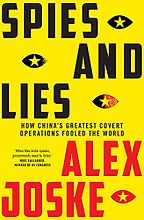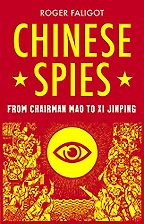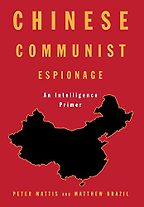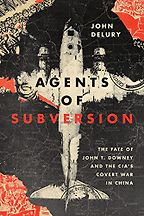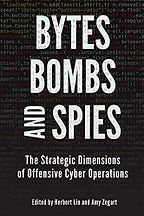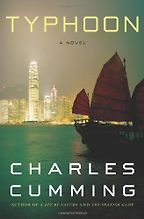Chinese Espionage
Last updated: February 05, 2023
When it comes to spy books, stories about British, American and Soviet secret agents loom large. Everyone has heard of Russia's KGB (now the FSB), the CIA, Britain's MI6 and even Mossad. Fewer people know about China's spying department, the 国家安全部 (Guójiā Ānquán Bù, 'Guoan' for short) or Ministry of State Security (MSS). There are also not as many books about it, whether spy thrillers or more serious works of nonfiction. We've listed some options below:
Spies and Lies: How China's Greatest Covert Operations Fooled the World
by Alex Joske
Spies and Lies is a recent (October 2022) and readable account of Chinese espionage activities by Alex Joske, an Australian analyst who knows China well and has scoured Chinese language sources to put this story together. It’s a lot about how some apparently Western-friendly, reformist figures turn out to have been agents of the Ministry for State Security, spreading the influence of China’s ruling party around the world.
Chinese Spies: From Chairman Mao to Xi Jinping
by Natasha Lehrer (translator) & Roger Faligot
Chinese Spies is by a French journalist, Roger Faligot, who has written a lot about intelligence. This is a history of spying in China from the 20th century onwards, starting with the founding of the Chinese Communist Party in 1921, which was broken up by the police. The Soviets loom large in the early years. Faligot writes: “The history of the Chinese Communist Party had barely even begun and it had already exposed a shadowy web of informants, secret police and spies.”
Chinese Communist Espionage: An Intelligence Primer
by Matthew Brazil & Peter Mattis
Chinese Communist Espionage: An Intelligence Primer bills itself as a reference guide and though definitely aimed at specialists, it’s not inaccessible. It gives a historical perspective—one of the authors is a historian of early CCP intelligence operations—and highlights the critical importance of Chinese language sources. It opens with the execution of a Chinese spy in 2011, who was revealed to have been working for the CIA. His pregnant wife was also executed, in front of their colleagues. “The two were shot in the ministry’s interior courtyard, the proceedings shown on closed-circuit television.” The book also covers domestic surveillance and the situation in Xinjiang.
“This book has many of the qualities of a spy novel, though it’s a true story…It’s about an American secret agent who ends up in Mao’s China during the Korean War and is a prisoner there for a long time…In this book, you learn a lot about Mao’s China, you learn about the Korean War, you learn about McCarthyism in America and even about the history of Chinese studies. All this is woven into this page-turner.” Read more...
Jeffrey Wasserstrom, Historian
Bytes, Bombs, and Spies: The Strategic Dimensions of Offensive Cyber Operations
by Amy Zegart & Herbert Lin
“It talks a lot about Chinese espionage from the People’s Liberation Army unit 61398.
They are a really interesting unit set up in about 2011 and very actively stealing corporate information on behalf of Chinese companies. They use US college campuses very effectively to exfiltrate information from companies. It’s totally fascinating. First of all, it lasts for so long. It goes on for years and years and years in the same US steel companies as well as Siemens Westinghouse. They’ve got access to every email and every server. They steal so much information and it’s so hard to understand what they do with it.
The narrative of US-China cyber espionage in terms of popular discussion often centers on this idea of ‘they’re stealing intellectual property and ruining US companies.’ You steal the intellectual property and then you make the iPhone. But that’s not at all how it works. Instead it’s all about, ‘Do we know how they’re going to come into this trade negotiation? Can we use this information to our advantage at all?’ I don’t mean to dismiss the threat of economic espionage, it’s just that the actual arc of it is very slow and very complicated and very hard to pull out. It’s very hard to show that, ‘Well, you only did that because of this information you stole.’”—Josephine Wolf on the best cyber security books.
Typhoon
by Charles Cumming
“In Typhoon I was trying to let people know what is going on in terms of human rights abuses in Xinjiang, the Uighur Muslim province in Northwest China… The most important thing that I can do is to keep people reading the books that I write – to entertain them and interest them in the characters I have created. Writers shouldn’t be preachy. But if at the same time I can add a layer of political commitment to my books, or whatever you want to call it, then that’s a laudable goal, as far as I’m concerned.” –Charles Cumming on the best books on Espionage.
